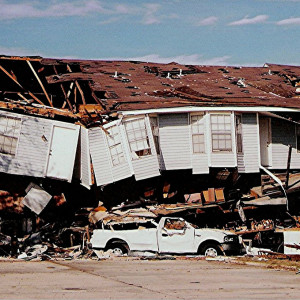Financial Preparation in the Face of a Catastrophe
We’ve provided you with tons of various ways and a wealth of information on how to remain physically safe if a catastrophe were to happen, but to this point, we’ve never talked about the financial matters, which are, in their own way, almost as important. Upon the end of the disaster, when you step out from your US Safe Room or bunker, what will your home look like? If it’s in shambles, did you protect you and your family’s futures with financial preparation? A disaster can potentially be terribly destructive for years to come if finances are not well-protected.
Tips, knowledge, and information for disaster recovery and financial porotection.

The four steps to financial security in terms of disaster prepping are:
- Comprehensive home insurance. Many people have home insurance but are unaware that their home owner’s insurance is not comprehensive or fails to fully cover for disasters. You should hire a contractor to come out and evaluate how much it would cost to rebuild the home. Use this information to then choose a policy with your insurance holder that would fully cover your home if it was completely destroyed. A review of your policy should be done annually, and if possible, the contractor should evaluate the home annually as well. If a contractor’s evaluation is completely out of the question, this online tool from AccuCoverage can help you estimate the replacement cost of your home for a small fee.
- Catastrophic insurance coverage. You can purchase a separate insurance policy which is designed to insure you in the case of a natural disaster. These policies can be really helpful due to their comprehensive nature and can cover anything from landslides to wildfires. The cost of insurance may seem daunting, but for those that live in natural disaster prone areas, this is a life-saver. Literally. Without it, recovering from a natural disaster that isn’t covered by your regular insurance would be a devastating blow to your family’s future.
- Photograph or video valuables. For claims and tax purposes, it would be very wise to have a documentation and proof of ownership of all valuables inside the house and garage. Cars, cameras, TVs, equipment, paintings, and anything else of value should be saved as a digital copy through photos or videos.
- Store, copy, and organize important records. In case of an emergency evacuation, it would be helpful to know exactly where and what documents you need to keep safe or bring with you. You may only have a short amount of time to evacuate, and attempting to find and organize this information on short notice will be stressful and nigh impossible. Consider storing these important documents in a modular safe room for immediate protection as well. Lastly, copy and backup these records and documents electronically for safe keeping, and consider storing them in the cloud.
Follow these tips, and use our other guidelines for safety, along with one of our featured US Safe Room® products, and you and your family will survive and prosper following a catastrophic event. Please call us at (828) 355-7155, and like our Facebook to stay up-to-date with disaster information and tips!





